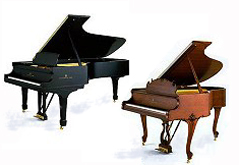Steinway Pianos (Advert)
Steinway
Piano Sales
finest quality steinway grand pianos (restored & unrestored). Mahogany,
Walnut, Ebony etc. All sizes and prices.




We have the cheapest prices on the planet. Steinway Grand Pianos to suit all
budgets.
Visit our STEINWAY
PIANO sales page for more info
Steinway & Sons History

Steinway & Sons was founded in 1853 by German immigrant Henry Engelhard Steinway in a Manhattan loft on Varick Street. Henry was a master cabinet maker who built his first piano in the kitchen of his Seesen, Germany home. By the time Henry established Steinway & Sons, he had built 482 pianos. The first piano produced by the company, number 483, was sold to a New York family for $500. It is now displayed at New York City's Metropolitan Museum of Art.
Over the next forty years, Henry and his sons, Henry Jr., Albert, C.F. Theodore, William, and Charles, developed the modern piano. Almost half of the company's 114 patented inventions were developed during this period. Many of these late nineteenth-century inventions were based on emerging scientific research, including the acoustical theories of the renowned physicist Hermann von Helmholtz
Steinway's revolutionary designs and superior workmanship began receiving national recognition almost immediately. Starting in 1855, Steinway pianos received gold medals at several U.S. and European exhibitions. The company gained international recognition in 1867 at the Paris Exhibition when it was awarded the prestigious "Grand Gold Medal of Honor" for excellence in manufacturing and engineering. It was the first time an American company had received this award. Steinway pianos quickly became the piano of choice for many members of royalty and won the respect and admiration of the world's great pianists.
In 1866 Steinway & Sons opened the first Steinway Hall on 14th Street. With a main auditorium of 2,000 seats, it became New York City's artistic and cultural center, housing the New York Philharmonic until Carnegie Hall opened in 1891. By this time, the company had moved to its current location in the Astoria section of Queens, New York, and built Steinway Village. Virtually its own town, Steinway Village had its own foundries, factory, post office, parks and housing for employees.
In 1871, Henry Sr. died and sons C.F. Theodore and William took over operations. An accomplished pianist, C.F. Theodore was responsible for the technical aspects of piano making and personally earned the company 41 patents, including one in 1875 for the modern concert grand piano. In the same year, William helped establish a showroom in London. Five years later, in 1880, the Hamburg factory began operating and a retail operation, the Steinway-Haus, was established. Another retail operation opened in Berlin in 1909.
Today, Steinway & Sons crafts approximately 5,000 pianos a year worldwide. Over 1300 prominent concert artists and ensembles across the world bear the title Steinway Artist. No artist or ensemble is a paid endorser of the piano. Each Steinway Artist personally owns a Steinway and has chosen to perform on the Steinway piano professionally. In North America, artists select their Steinway for concert performances from the company's unique "piano bank," an inventory of more than 300 pianos valued at over $15 million.
Pianos are placed throughout North America and are maintained to concert standards by an exclusive network of Steinway dealers. The famed "basement" of New York's Steinway Hall, at 109 West 57th Street in New York City, is the bank's home office. Branch piano banks are maintained at Steinway dealerships in cities throughout the country to serve performing artists. In all other countries, major concert venues in each town own Steinway & Sons instruments which the artist can use.
[based on text from the official Steinway Pianos website]